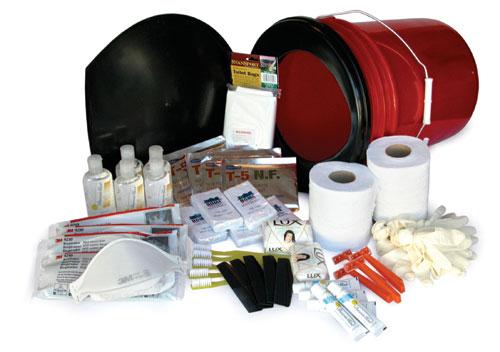The best way to maintain health is to keep yourself and your living area clean and sanitary. Poor hygiene and unsanitary conditions can cause sickness. Sanitation supplies should be a vital componet of your survival plans. There are many sanitation kits available through retailers. You may wish to create your own, or supplemment a commercial one.
Washing
Washing your hands before food preperation, before eating, and after using the bathroom are fundemental hygine pratices that can prevent illness. During an emergency, water is a precious resource, purified water should first be used for drinking, cooking, and washing dishes. Choose a designated bathing area. If you wash in a river or stream use biodegradable soap. With a little soap you can also wash yourself in the rain. Be sure to wear shoes to prevent parasitic infections and to protect you from cuts and puncture wounds that can easily become infected.
Food Sanitation
All food scraps should be either burned or buried in a pit far from your living area to keep animals away from you. Keep all your food covered and off the ground. Replace all lids on water bottles and other containers immediately after use. Do not wash your dishes in the area where you get your drinking water supply. Instead, wash your dishes away from a stream. Use clean plates or eat out of the original food containers to prevent the spread of germs. Wash and peel all fruits and vegetables before eating. Prepare only as much as will be eaten at each meal.
Sanitation
Choosing the right location for your sanitation needs is as important as staying clean. Your waste place must be located downhill from any usable water source. It should also be a minium of 150 feet from any surface water. You should always bury biodegradable garbage and human waste to avoid the spread of disease by rats and insects. Make a latrine, by digging a long trench approximately one foot wide and 12 to 18 inches deep and cover as you go. When you dig too deep a latrine it can retard the bacterial breakdown process. It also helps to have your waste placed downwind from your living area.
Makeshift Toilets
You can make an emergency toilet from a 5 gal. bucket lined with heavy-duty garbage bag. Make sure you have a lid to cover it. A plastic toilet seat can be purchased to fit on the bucket for a more comfortable seat.
With some basic knowledge and preparation, you can stay clean and healthy, even during an emergency situation.

